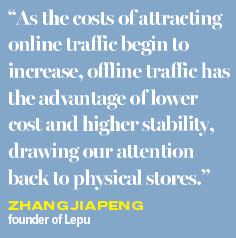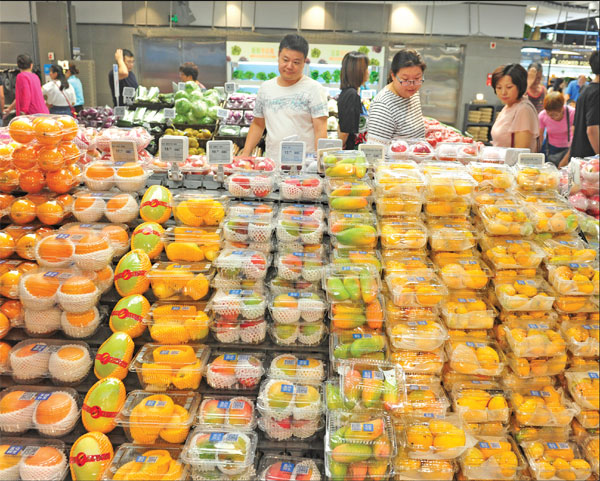Online stores go offline using data

Thanks to the popularity of the internet, online stores have proliferated at high speed and already have a considerable share of the market in goods ranging from business supplies to those for personal use. Brick-and-mortar stores, large or small, are all thinking of going online.
However, in recent years, a new trend has been seen in the opposite direction. Online giants have started to focus on setting up physical stores to attract offline customers and convert them to shopping online.
Zhang Jiapeng, founder of Lepu, says his company helps retailers select store sites and evaluates business opportunities.
| Visitors at Hema Xiansheng's store in Beijing. The store, which is operated by Alibaba, is an aggregation of supermarket, grocery store and restaurant, allowing customers to buy online or offline. Provided to China Daily |
"As the costs of attracting online traffic begin to increase, offline traffic has the advantage of lower cost and higher stability, drawing our attention back to physical stores. You can see the trend from Alibaba and JD's recent establishment of physical stores."
Hema Xiansheng is an emerging online-to-offline supermarket operated by Alibaba. The store is an aggregation of supermarket, grocery store and restaurant, allowing customers to buy online or offline. Last year, it opened the first offline store in Shanghai; within a year, 12 more have sprung up in Shanghai, Beijing and Ningbo.
On April 10, Liu Qiangdong, CEO of JD, announced that the company will open a million convenience stores around the country in the next five years. Also, the company will set up 5,000 stores to cater to childcare and maternity needs.
It is the same globally.
Amazon, the US e-commerce giant, has been dabbling in physical retail since 2015. At the end of 2016, its prototype grocery store Amazon Go started to sell goods, with customers able to buy without using a cashier or a checkout station. Two months ago, Amazon announced its acquisition of Whole Foods, a US supermarket chain exclusively featuring organic foods.
"One of the wonderful things about groceries is that, compared to other e-commerce purchases, groceries are habitual and frequent. People need groceries every week," said Jeremy Stanley, vice-president of data science for Instacart, in a CNBC interview. His answer shows why grocery stores are the first to go offline and points to the potential of offline grocery stores.

Unlike online stores, physical stores need to pay great attention to site selection and the type of business. But data can now add a new twist to the old practice of shopkeepers choosing the location and business type relying on limited research.
Based on its data, AutoNavi, a Chinese mapping and navigation provider, has established a regional analysis platform providing regional heat analysis, population attributes and behavior analysis for different kinds of groups.
The platform also offers business intelligence, including analysis on passengers, customers, source and shop location for shopowners.
Traditionally, for example, a businessman planning to open a store in a certain neighborhood might have needed to spend months around the potential location to observe customer flow, gender ratio or purchasing power. But with the new data, he can just sit in his office and get reports that contain detailed analysis on all issues.
The index provides guidance on how to choose a business category based on the population attributes, which reflect consumption ability, buying preferences and patterns of people within a certain area, thus giving decision-makers a good idea on how to conduct their business.
Reflecting that trend, Hema Xiansheng sets up offline stores in residential areas such as Daning in Shanghai and Shilipu in Beijing, where it can attract more people who are in regular need of fresh vegetables and meat.
liuxuan@chinadaily.com.cn
(China Daily Africa Weekly 08/25/2017 page7)
Today's Top News
- Foreign ministers of China, Egypt call for Gaza progress
- Shield machine achieves Yangtze tunnel milestone
- Expanding domestic demand a strategic move to sustain high-quality development
- Xi hears report from Macao SAR chief executive
- Xi hears report from HKSAR chief executive
- UN envoy calls on Japan to retract Taiwan comments































